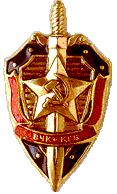
KGB (Cyrillic, КГБ) is the Russian abbreviation for Committee for State Security (Russian: Комитет государственной безопасности, Komityet Gosudarstvennoy Bezopasnosti), which was the official name the umbrella organization serving as the Soviet Union's premier security agency, secret police, and intelligence agency, from 1954 to 1991. Then, the official name of this organization was changed to FSB (ФСБ, Федеральная служба безопасности), although the acronym KGB may apply to the secret police of various epochs.
KGB in The Gladiator[]
After the Soviet Union won the Cold War, the KGB was the model to which all governments' secret police aspired. Even so, the KGB was unparalleled in its ruthless efficiency in rooting out the enemies of the state. Moreover, the KGB was the proving ground for the Soviet Union's most ambitious citizens; those who sought power climbed the ladder of the KGB to get it.[1]
KGB in A World of Difference[]
During Mikhail Gorbachev's nine month tenure as General-Secretary in 1985, the KGB, which had traditionally been given a free reign by Soviet authorities, was often called to account for abuses of power. After Gorbachev's death from a cerebral hemorrhage, in which some suggested the KGB played a role, it regained its earlier independence.
In 1989, the KGB planted two agents aboard the Tsiolkovsky to ensure that its crew remained politically dependable. One, Oleg Lopatin, was openly known to be a chekist (a term by which secret policemen were known in the USSR). The other, Yuri Voroshilov, kept his identity a secret from all his crewmates until he apprehended Shota Rustaveli warning the crew of the American shuttle Athena that Fralk was leading an army of Skarmer across Jotun Canyon into Omalo territory.
See also[]
- NKVD, the 1930s-40s equivalent of the KGB. In some Harry Turtledove timelines, the NKVD continued to exist into the 1950s-60s or even later.
- MGB, the 1940s-50s equivalent.
- GRU, the Soviet military intelligence which continues to exist in the Russian Federation.
References[]
- ↑ The Gladiator, pg. 83, HC.
| |||||||||||||||||||
| |||||||||||||||||||

